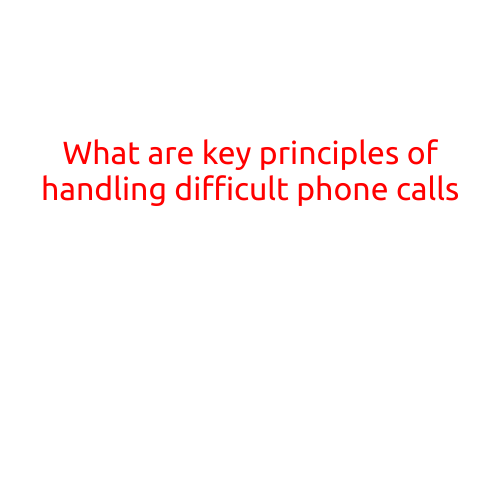
What are the Key Principles of Handling Difficult Phone Calls?
Receiving a difficult phone call can be a daunting experience for anyone. Whether it’s a customer complaint, a potential client expressing concerns, or a difficult conversation with a colleague or family member, the stakes can feel high. However, with the right approach and skills, you can navigate even the toughest phone calls with confidence and come out on top.
In this article, we’ll explore the key principles of handling difficult phone calls, helping you to stay calm, build trust, and find effective solutions in the most challenging situations.
1. Stay Calm and Composed
The first principle of handling difficult phone calls is to stay calm and composed. It’s natural to feel nervous or anxious when facing a challenging conversation, but it’s essential to manage your emotions and maintain a level head. Take a few deep breaths, and remind yourself that the conversation is about finding a resolution, not about winning an argument.
2. Listen Actively
Active listening is crucial when handling difficult phone calls. Pay attention to the caller’s concerns, ask clarifying questions, and restate what you’ve understood to ensure you’re on the same page. This shows that you value their input and are genuinely interested in finding a solution.
3. Empathize and Acknowledge
Difficult phone calls often involve strong emotions. Empathize with the caller’s feelings and acknowledge their perspective. This helps to build trust and shows that you’re committed to resolving the issue.
4. Focus on Solutions, Not Blame
When dealing with a difficult phone call, it’s easy to get caught up in who’s to blame. However, focusing on solutions rather than assigning blame can help to diffuse tension and lead to a more constructive conversation.
5. Be Transparent and Honest
Be open and transparent in your communication. If you’re unsure about something, it’s better to say so rather than making assumptions or providing false information. Honesty and transparency can help to build trust and credibility.
6. Use a Positive and Non-Confrontational Tone
The tone you use when handling a difficult phone call can make all the difference. Speak in a positive and non-confrontational tone, avoiding aggressive language or defensiveness. This helps to keep the conversation focused on finding a solution rather than escalating the situation.
7. Take Notes
Taking notes during the call can help you to stay focused and ensure that you don’t miss important details. It also shows the caller that you’re committed to following up on their concerns.
8. Be Proactive and Solution-Focused
When handling difficult phone calls, it’s essential to be proactive and solution-focused. Anticipate potential issues and offer solutions before the caller has to ask. This demonstrates your commitment to resolving the issue and demonstrates your willingness to take initiative.
9. Follow Up
After the call, be sure to follow up on any agreements or actions discussed. This helps to maintain trust and ensures that the issue is resolved to your caller’s satisfaction.
10. Practice and Review
Finally, the key to handling difficult phone calls effectively is practice and review. Reflect on past conversations, identifying what worked well and what didn’t. Use this feedback to improve your skills and prepare for future challenging calls.
By incorporating these key principles into your approach, you can confidently handle even the most difficult phone calls and come out on top. Remember to stay calm, listen actively, empathize, and focus on solutions – and always prioritize transparency, positivity, and proactive communication. With these skills, you’ll be well-equipped to navigate even the toughest conversations and build strong relationships with your customers, colleagues, and friends.





